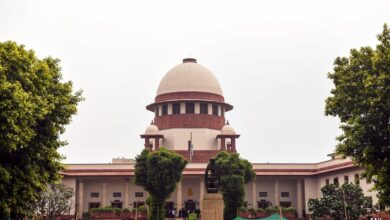How Chief Justice Of India DY Chandrachud Fast-Tracked Rape Survivor’s Abortion Request


The Supreme Court allowed the 28-week-pregnant woman to have an abortion. (file)
New Delhi:
The Gujarat High Court wasted 12 crucial days in allowing a rape survivor to have an abortion in the 26th week of her pregnancy, while the Supreme Court not only allowed the victim to have an abortion within 12 hours, but also issued important guidelines.
According to Supreme Court sources, in view of the lax attitude of the High Court, advocate Vishal Arun Mishra, on behalf of the survivor who had crossed 27 weeks of pregnancy by that time, filed the petition in the top court on August 18 at around 1 am.
On August 18, a Friday, he mentioned it in front of the Registrar. Chief Justice of India DY Chandrachud was informed about it at around 9:30 pm.
Considering the seriousness of the case, the CJI directed the Registrar to ask Justice BV Nagarathna whether she could hold a special hearing the next morning.
According to sources, Justice Nagarathna immediately agreed, and the CJI formed a bench comprising Justice Ujjal Bhuyan and her to hear the case.
At 10:30 am on Saturday, the bench started the hearing. It raised questions on the delay by the Gujarat High Court, and constituted a new medical board with instructions to file the report in 24 hours, by Sunday evening.
On Monday, the Supreme Court, after seeing the report of the Medical Board, allowed the 28-week-pregnant woman to have an abortion.
“Subsequent to the medical procedure to be carried out, in the event the foetus is found to be alive, the hospital is to give all facilities including incubation to ensure the foetus survives. The State shall then take steps to ensure the child is adopted in accordance with law” the Supreme Court said in the judgment.
Solicitor General Tushar Mehta, on humanitarian grounds, suggested that if the foetus is alive during the abortion process, the government can take care of it, and then take steps for adoption.
Mr Mehta mentioned an earlier incident where a minor, who was initially insisting on termination of her pregnancy, was persuaded to give birth to the child, and it was given for adoption after a Supreme Court order.
According to sources in the top court, CJI Chandrachud has also included the facility to e-mail in the Standard operating Procedure prepared for hearing urgent cases. The CJI personally monitors this on a daily basis.
The Registrar has been instructed to inform the CJI about urgent matters so that a bench can be formed, and the matter heard on time.
The Supreme Court was disappointed that the high court passed an order on Saturday, even after it had listed the matter for Sunday. The high court had refused relief to the petitioner.
“What is happening in Gujarat High Court? No court in India can pass an order against a superior court order. It is against constitutional philosophy,” it had said.
However, it accepted the request of SG Tushar Mehta not to comment on the High Court.
Justice Nagarathna, though, while making oral observations, said that crucial time was lost due to the High Court.
The 25-year-old survivor claims that the pregnancy was detected on August 4. Her counsel told the Supreme Court that she approached the court on August 7 and the matter was heard the next day. The high court on August 8 directed that a medical board be formed to look into the status of the petitioner’s pregnancy and her health condition.
A medical college examined the rape survivor and submitted its report on August 10. The report, the petitioner’s counsel said, had ruled that the pregnancy can be terminated, but the High Court adjourned the matter for August 17, and then did not even issue an order.
The petitioner then came to know that her request was rejected, and knocked on the Supreme Court’s doors.
The Supreme Court noted that the report was taken on record by the high court on August 11 but “strangely”, the matter was listed 12 days later, “losing sight of the fact that every day’s delay was crucial and of great significance having regard to the facts and circumstances of the case”.
“In such cases, there must be, not undue urgency, but at least a sense of urgency in such matters and not a lackadaisical attitude of treating it as any normal case and just adjourning it. We are sorry to say and make this remark,” the bench said in oral observations.




